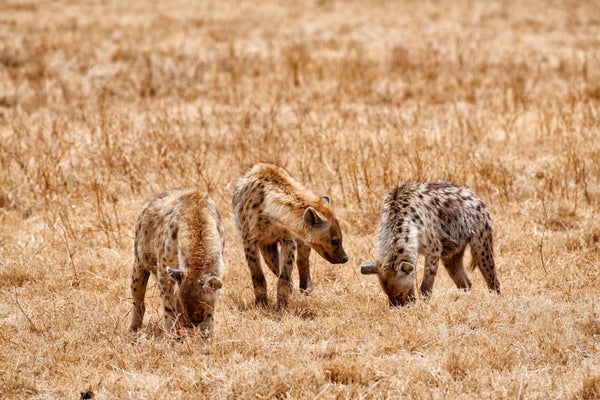Jason Goldman: Morning in Tanzania. The sun rises over the Ngorongoro Crater. The spotted hyenas are beginning their day, while Eve Davidian from Germany's Leibniz Institute for Zoo and Wildlife Research sits nearby in a truck, watching and waiting.
[Hyena sounds]
The most exciting part of her day is when a male hyena crouches on his hind legs to poop.
On supporting science journalism
If you're enjoying this article, consider supporting our award-winning journalism by subscribing. By purchasing a subscription you are helping to ensure the future of impactful stories about the discoveries and ideas shaping our world today.
Eve Davidian: "So I did collect a lot of fecal samples, monitor a lot of behavior, spend a lot of time following males on site in Tanzania in the field."
Goldman: Biologists have been monitoring the eight hyena clans of Tanzania's Ngorogoro Crater for twenty-five years. They've learned a lot about the species, but there are still some outstanding mysteries.
"Why is it that high ranking individuals, in particular high ranking males, often are more successful than low ranking males in terms of reproduction?... [2:04] In spotted hyenas in contrast to many other mammals, males don't fight to access high social rank. And they also don't fight to access breeding partners. So it is quite puzzling why high ranking males, if they don't fight and they are not necessarily more attractive to females, why they should be more successful than males of lower social rank?"
Goldman: In all, Davidian had nearly 400 fecal samples collected from 120 male hyenas. She analyzed the hormones inside of them and discovered that interactions among male hyenas were more stressful for lower ranking males. And as a result, they spent more time alone. The results were published in the journal Functional Ecology.
Davidian: "And the consequence of that is that lower ranking males, they spend less time courting females and are therefore less successful in terms of the number of offspring they produce compared to high ranking males, who spend most of their time courting females."
Goldman: All that time spent alone recovering from stress means that the lower-ranking hyenas aren't spending their time courting females. And the females that they do manage to spend time with are themselves also of lower rank.
The researchers think it has to do with the fact that lower-ranking males tend to be newcomers within hyena clans. It takes time to develop their support networks among other males.
Davidian: "They do have to spend a lot of time building up and maintaining these relationships before they can even think about courting females."
Goldman: So for male spotted hyenas, it might be that the best path towards romance is to begin with…a bromance.
[Hyena sounds]
—Jason G. Goldman
(The above text is a transcript of this podcast)
[Eve Davidian et al. The interplay between social rank, physiological constraints and investment in courtship in male spotted hyenas.]

